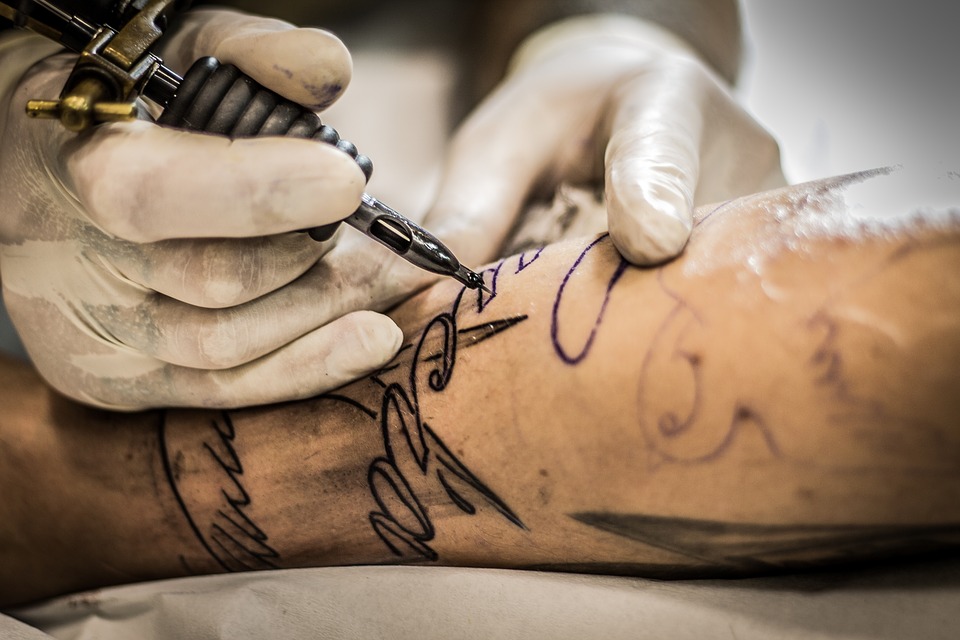
Tattoos have been a popular form of body art for thousands of years, with people using ink and needles to adorn their skin with permanent designs. However, one question that many people have about tattoos is will tattoos will fade over time. In this article, we’ll explore the factors that can cause tattoos to fade and what you can do to help your tattoos stay vibrant for years to come.
So, Will Tattoos Fade Over Time?
Firstly, it’s important to understand that all tattoos will fade to some extent over time. This is because the ink used in tattoos is deposited into the skin’s dermis, which is a deeper layer than the epidermis that makes up the outermost layer of the skin. Over time, the skin naturally sheds dead cells from the epidermis, which can cause the tattoo to appear less vibrant. Additionally, exposure to sunlight, air pollution, and other environmental factors can also contribute to tattoo fading.
Another factor that can affect tattoo fading is the quality of the ink used. Higher quality inks are less likely to fade than cheaper, lower quality inks. This is because they contain more pigment and are made with better quality ingredients. However, even high-quality inks will fade over time due to the natural processes of the skin.
Another factor that can affect tattoo fading is the location of the tattoo on the body. Tattoos on areas of the body that are exposed to more sunlight and friction, such as the hands and feet, are more likely to fade than tattoos on areas of the body that are covered by clothing, such as the back or chest. This is because the sun’s UV rays can break down the ink particles in the skin, and friction from clothing or other objects can cause the skin to shed more quickly.
Fortunately, there are steps you can take to help your tattoos stay vibrant for as long as possible. One of the most important things you can do is to protect your tattoos from the sun. This means wearing clothing that covers your tattoos when you’re outside, using a high-quality sunscreen with a high SPF, and avoiding spending too much time in direct sunlight. Additionally, you can moisturize your skin regularly to keep it hydrated and healthy, which can help your tattoos stay vibrant.
Another way to prevent tattoo fading is to choose a reputable tattoo artist who uses high-quality inks and equipment. A skilled artist will be able to apply the ink evenly and deeply into the skin, which can help the tattoo stay vibrant for longer. Additionally, a good artist will provide you with aftercare instructions to help you take care of your new tattoo and prevent it from fading.
Finally, if you do notice that your tattoo is starting to fade, there are ways to touch it up and restore its vibrancy. Many tattoo artists offer touch-up services, where they can go over the tattoo with fresh ink to restore its color and definition. Additionally, there are products on the market, such as tattoo aftercare creams and serums, that can help promote healthy skin and prevent tattoo fading.
In conclusion, while tattoos will inevitably fade over time, there are steps you can take to prevent excessive fading and keep your tattoos looking vibrant for as long as possible. By protecting your skin from the sun, choosing a reputable tattoo artist, and taking good care of your tattoos, you can enjoy your body art for many years to come. And if your tattoos do start to fade, don’t worry – there are plenty of ways to restore their vibrancy and keep them looking their best.

What you can do to prevent tattoo fading over time:
- Protect your tattoo from sunlight by wearing clothing that covers it or applying a high-SPF sunscreen
- Moisturize your skin regularly to keep it hydrated and healthy
- Choose a reputable tattoo artist who uses high-quality inks and equipment
- Follow your artist’s aftercare instructions carefully, including keeping the tattoo clean and moisturized
- Avoid picking or scratching your tattoo as it heals, which can cause scarring and affect the tattoo’s appearance
- Avoid exposing your tattoo to water for long periods, such as soaking in a bath or swimming after tattoos in a pool or the ocean
- Consider getting touch-up services from your tattoo artist if you notice fading or loss of definition
- Use tattoo aftercare products, such as creams or serums, to promote healthy skin and prevent fading
- Avoid using harsh skincare products, such as exfoliants or chemical peels, on the tattooed area
- Maintain a healthy lifestyle, including drinking plenty of water and eating a balanced diet, which can help promote healthy skin and prevent fading.
More info about why tattoos may fade over time
- Natural skin shedding process: The skin is a living organ that is constantly renewing itself by shedding old skin cells and replacing them with new ones. As a result, the skin’s top layer, called the epidermis, is constantly shedding, which can cause tattoos to fade over time. When old skin cells are shed, they take some of the tattoo ink with them, resulting in a loss of vibrancy and definition.
- Exposure to sunlight and UV rays: Exposure to sunlight and UV rays is one of the primary causes of tattoo fading. UV rays can penetrate the skin’s layers and break down the ink pigments, causing the tattoo to fade over time. Additionally, sunlight can cause the skin to dry out and become damaged, which can also affect the tattoo’s appearance.
- Environmental factors such as air pollution: Environmental factors such as air pollution can also contribute to tattoo fading. Pollution can cause the skin to become dry and damaged, which can affect the appearance of the tattoo. Additionally, pollutants can react with the tattoo ink, causing it to break down and fade.
- Friction and rubbing from clothing or objects: Friction and rubbing from clothing or objects can also cause tattoo fading, particularly in areas where the tattoo is exposed to constant rubbing or friction. This can cause the ink pigments to break down and fade over time, resulting in a loss of vibrancy and definition.
- Low-quality ink with less pigment and cheaper ingredients: Low-quality ink with less pigment and cheaper ingredients is more likely to fade than high-quality ink. Cheaper inks may contain fewer pigments, which means that the ink will not be as vibrant and may fade faster over time. Additionally, cheaper inks may contain lower-quality ingredients that can break down more easily, causing the tattoo to fade.
- Tattoo location on the body, with areas exposed to more sunlight and friction being more prone to fading: The location of the tattoo on the body can also affect its longevity. Areas of the body that are exposed to more sunlight and friction, such as the hands, feet, and neck, are more prone to fading than areas that are covered by clothing and are less exposed to the elements.
- Poor aftercare, such as failing to keep the tattoo clean and moisturized: Poor aftercare can also contribute to tattoo fading. Failing to keep the tattoo clean and moisturized can cause the skin to become dry and damaged, which can affect the appearance of the tattoo. Additionally, not following proper aftercare instructions can cause scarring, which can also affect the tattoo’s appearance.
- Scarring from the tattooing process: Scarring from the tattooing process can also affect the appearance of the tattoo. Scarring can cause the ink pigments to become distorted, leading to a loss of vibrancy and definition. Additionally, scarring can cause the skin to become uneven, which can affect the tattoo’s appearance.
- Using harsh skincare products on the tattooed area: Using harsh skincare products on the tattooed area can also contribute to tattoo fading. Harsh products can cause the skin to become dry and damaged, which can affect the appearance of the tattoo. Additionally, some skincare products contain ingredients that can react with the tattoo ink, causing it to break down and fade over time.
- Age, as older skin is less able to retain ink: Finally, age can also contribute to tattoo fading. As the skin ages, it becomes less able to retain ink, leading to a loss of vibrancy and definition. Additionally, the skin becomes thinner and more delicate with age, which can also affect the appearance of the tattoo.

Sorry, the comment form is closed at this time.